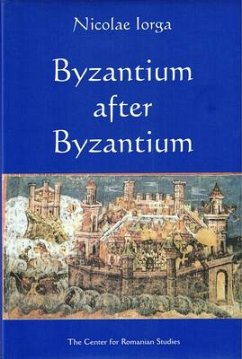Although Constantinople fell to the Turks in 1453, bringing an end to the Eastern Roman Empire which had survived its predecessor in the West by nearly one thousand years, this important book argues that Byzantium did not die, but continued to influence European history all the way up to the beginning of the nineteenth century. This English translation of one of the classic works by the great Romanian historian Nicolae Iorga will fascinate anyone interested in the impact of the fall of Byzantium on European civilization and the continuation of Byzantine institutions in Southeastern Europe. Originally published in French in 1935, this book contributes to an understanding of the political, social, cultural, and intellectual background of the history of the tumultuous regions of Southeastern Europe. Iorga points out the great contributions of Byzantine civilization to the Western world, especially during the Renaissance. He demonstrates that Byzantium survived through its people and local








